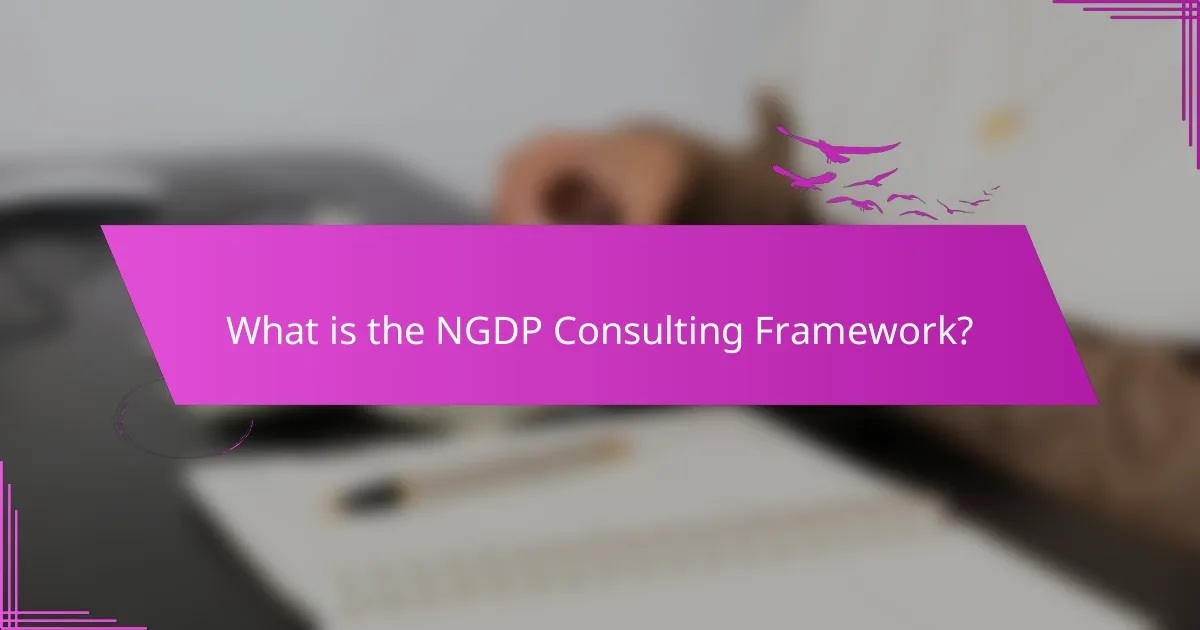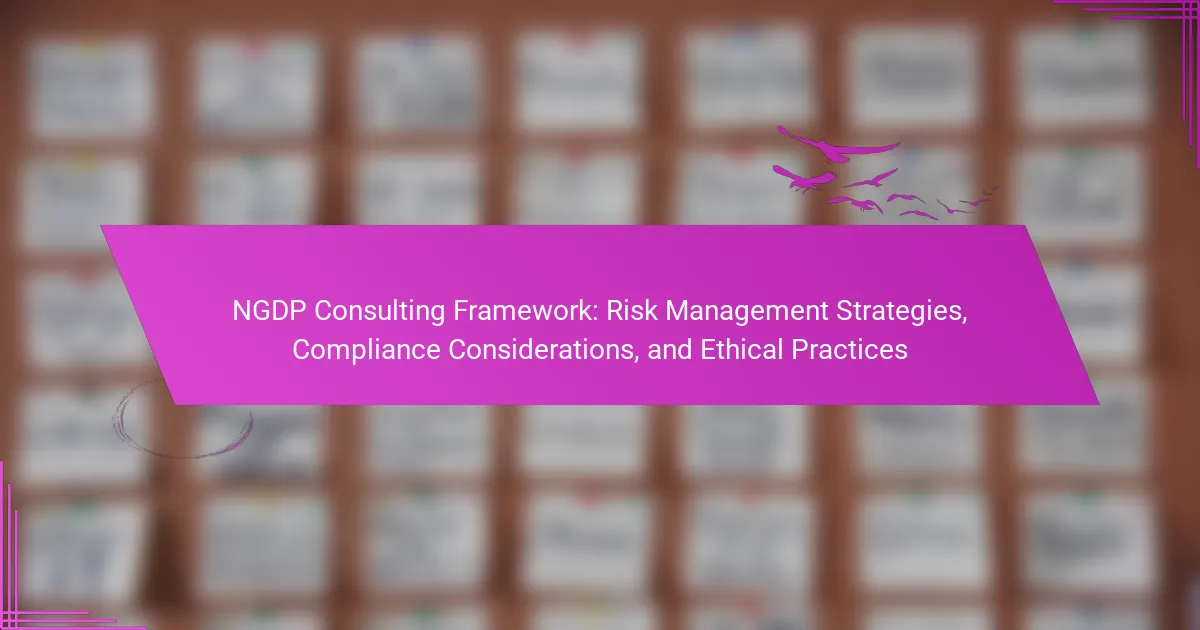
What is the NGDP Consulting Framework?
The NGDP Consulting Framework is a structured approach for managing organizational risks and ensuring compliance. It integrates various strategies to address potential challenges in business operations. This framework emphasizes ethical practices and accountability in decision-making processes. It also provides guidelines for aligning business objectives with regulatory requirements. The NGDP Consulting Framework is designed to enhance organizational resilience and adaptability. Its implementation can lead to improved stakeholder trust and business sustainability.
How does the NGDP Consulting Framework facilitate risk management?
The NGDP Consulting Framework facilitates risk management by providing structured methodologies for identifying, assessing, and mitigating risks. This framework emphasizes a systematic approach to risk analysis. It incorporates tools for risk evaluation, ensuring comprehensive coverage of potential threats.
The framework also promotes stakeholder engagement, which enhances transparency and accountability in risk management. By integrating compliance considerations, it aligns risk strategies with regulatory requirements. This reduces the likelihood of legal issues arising from non-compliance.
Additionally, the NGDP Consulting Framework encourages continuous monitoring and review of risk management practices. This adaptability ensures that organizations remain responsive to emerging risks. Overall, the framework enhances organizational resilience by fostering a proactive risk management culture.
What are the key components of risk management in the NGDP Consulting Framework?
The key components of risk management in the NGDP Consulting Framework include risk identification, risk assessment, risk mitigation, and risk monitoring. Risk identification involves recognizing potential risks that could impact project outcomes. Risk assessment evaluates the likelihood and impact of these identified risks. Risk mitigation focuses on developing strategies to minimize or eliminate risks. Risk monitoring ensures ongoing evaluation of risks throughout the project lifecycle. Each of these components is essential for effective risk management and helps ensure project success.
How do these components interact within the framework?
The components of the NGDP Consulting Framework interact through a structured approach to risk management, compliance, and ethical practices. Risk management identifies potential threats and assesses their impact. Compliance considerations ensure that all actions adhere to legal and regulatory standards. Ethical practices guide decision-making and promote integrity throughout the process. Together, these components create a cohesive system. They support each other by providing checks and balances. For instance, effective risk management can lead to better compliance outcomes. Ethical practices enhance trust, which is essential for effective risk management. This interconnectedness fosters a holistic approach to organizational governance.
What role does compliance play in the NGDP Consulting Framework?
Compliance ensures adherence to laws and regulations within the NGDP Consulting Framework. It serves as a foundational element for risk management strategies. By maintaining compliance, organizations mitigate legal risks and enhance their reputation. Compliance also fosters ethical practices, promoting integrity in consulting processes. Furthermore, it enables effective governance and accountability. This framework aligns business objectives with regulatory requirements. Consequently, compliance plays a critical role in sustaining operational effectiveness and stakeholder trust.
What are the essential compliance considerations within the framework?
Essential compliance considerations within the NGDP Consulting Framework include adherence to regulatory requirements, risk assessment protocols, and ethical standards. Regulatory requirements ensure that organizations comply with local and international laws. Risk assessment protocols help identify and mitigate potential compliance risks. Ethical standards guide decision-making processes and promote integrity within the organization. Organizations must also ensure proper documentation and reporting practices to maintain transparency. Regular training and updates on compliance policies are crucial for all employees. These considerations are vital for maintaining organizational credibility and avoiding legal repercussions.
How can organizations ensure adherence to compliance standards?
Organizations can ensure adherence to compliance standards by implementing a robust compliance management system. This system should include regular training for employees on compliance requirements. It is essential to conduct periodic audits to assess adherence to standards. Organizations must establish clear policies and procedures that align with compliance regulations. Monitoring and reporting mechanisms should be in place to track compliance activities. Engaging with legal and regulatory experts can provide guidance on compliance matters. Additionally, fostering a culture of compliance within the organization encourages accountability. Studies show that organizations with effective compliance programs reduce the risk of violations by up to 50%.
Why are ethical practices important in the NGDP Consulting Framework?
Ethical practices are crucial in the NGDP Consulting Framework because they ensure integrity and trust. This framework relies on transparency and accountability in decision-making processes. Ethical behavior fosters strong relationships with clients and stakeholders. It helps mitigate risks associated with unethical conduct, such as legal penalties and reputational damage. Research shows that organizations prioritizing ethics experience higher employee morale and retention rates. Furthermore, ethical practices promote compliance with regulations and industry standards. This alignment reduces the likelihood of conflicts and enhances overall project success.
What ethical guidelines should consultants follow within the framework?
Consultants should follow several ethical guidelines within the framework. These guidelines include integrity, confidentiality, and professionalism. Integrity requires consultants to provide honest and accurate information. Confidentiality mandates that consultants protect sensitive client information. Professionalism involves maintaining a high standard of conduct in all interactions. Additionally, consultants should avoid conflicts of interest. They must disclose any potential conflicts to their clients. Adhering to these guidelines fosters trust and accountability in consulting relationships. Research by the International Council of Management Consulting Institutes highlights the importance of these ethical standards in maintaining industry credibility.
How do ethical practices influence client relationships?
Ethical practices significantly enhance client relationships. They build trust and foster loyalty between clients and service providers. When businesses adhere to ethical standards, clients feel valued and respected. This leads to improved communication and collaboration. Ethical practices also reduce the risk of conflicts and misunderstandings. A study by the Ethics Resource Center found that organizations with strong ethical cultures experience higher employee engagement and customer satisfaction. Clients are more likely to remain loyal to companies that prioritize integrity and transparency. Overall, ethical practices create a foundation for long-lasting, positive client relationships.
How does risk management integrate with compliance and ethics in the NGDP Consulting Framework?
Risk management integrates with compliance and ethics in the NGDP Consulting Framework by ensuring that all operational practices adhere to legal standards and ethical norms. This integration involves identifying risks associated with non-compliance and ethical breaches. Risk management processes include regular assessments to evaluate compliance with regulations. It also involves training staff on ethical practices and compliance requirements. The framework promotes a culture of accountability and transparency. Regular audits and reviews are conducted to ensure adherence to ethical guidelines. This systematic approach helps mitigate risks and fosters a compliant organizational environment. Ultimately, the integration enhances organizational integrity and stakeholder trust.
What are the specific risk management strategies employed in the NGDP Consulting Framework?
The NGDP Consulting Framework employs several specific risk management strategies. These include risk identification, risk assessment, and risk mitigation. Risk identification involves recognizing potential risks that could impact the project. Risk assessment evaluates the likelihood and impact of these identified risks. Risk mitigation strategies are then developed to minimize or eliminate the effects of risks. Additionally, continuous monitoring of risks is integral to the framework. This proactive approach ensures that risks are managed throughout the project’s lifecycle. Each strategy is designed to enhance project resilience and success.
How do these strategies contribute to overall project success?
Risk management strategies, compliance considerations, and ethical practices significantly contribute to overall project success. They ensure that potential risks are identified and mitigated early in the project lifecycle. This proactive approach minimizes disruptions and enhances project stability. Compliance with regulations prevents legal issues that could derail progress. Ethical practices foster trust among stakeholders, leading to better collaboration. Research indicates that projects adhering to these strategies are 30% more likely to meet their objectives on time and within budget. By integrating these elements, organizations can achieve sustainable success and maintain a positive reputation.
What challenges might arise when implementing these strategies?
Challenges in implementing risk management strategies include resistance to change among staff. Employees may be hesitant to adopt new processes. This can lead to inconsistent application of strategies. Additionally, lack of training can result in misunderstandings of compliance requirements. Insufficient resources may hinder effective implementation. Organizations often face difficulties in aligning strategies with existing policies. Monitoring and evaluation can also be complex, requiring dedicated effort. These challenges can ultimately affect the overall effectiveness of the strategies.
What best practices can organizations adopt when utilizing the NGDP Consulting Framework?
Organizations can adopt several best practices when utilizing the NGDP Consulting Framework. First, they should ensure clear communication of objectives among all stakeholders. This clarity fosters alignment and a shared understanding of goals. Second, organizations must integrate risk assessment into every phase of the framework. This integration allows for proactive identification and mitigation of potential issues. Third, regular training on compliance and ethical practices is essential. This training ensures that team members are aware of regulations and ethical standards. Fourth, organizations should leverage data analytics for informed decision-making. Data-driven insights enhance the effectiveness of strategies implemented through the framework. Finally, continuous feedback loops should be established to refine processes. This practice promotes adaptability and responsiveness to changing circumstances. These best practices collectively enhance the effectiveness of the NGDP Consulting Framework in achieving organizational objectives.
The NGDP Consulting Framework is a structured approach designed to manage organizational risks while ensuring compliance and ethical practices. This framework encompasses key components such as risk identification, assessment, mitigation, and monitoring, promoting a proactive risk management culture. It emphasizes the importance of aligning business objectives with regulatory requirements to enhance stakeholder trust and organizational resilience. Furthermore, ethical guidelines play a critical role in fostering integrity and accountability in decision-making processes, ultimately contributing to project success and sustainability.
